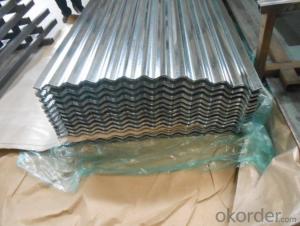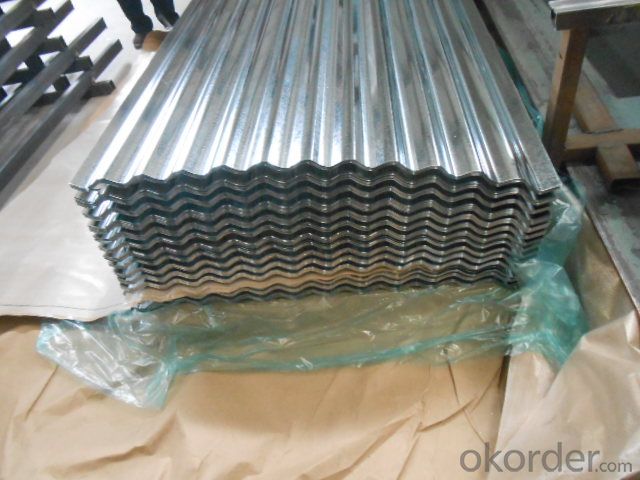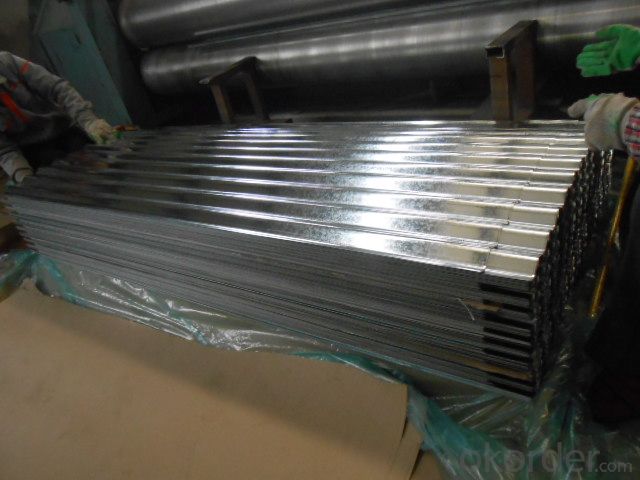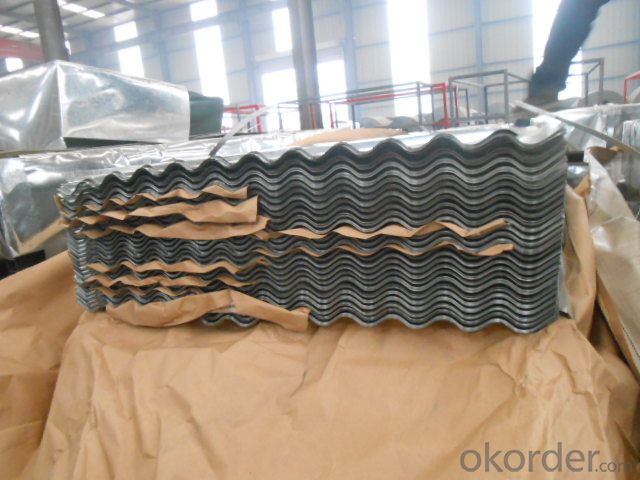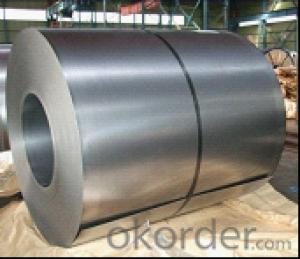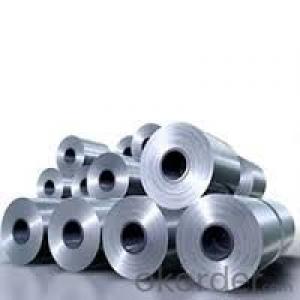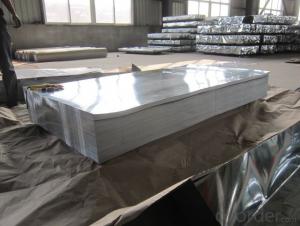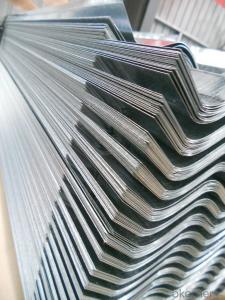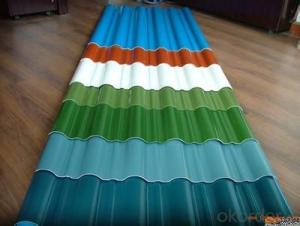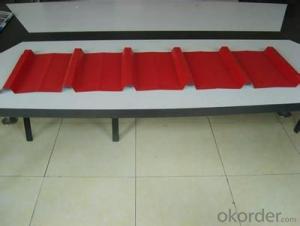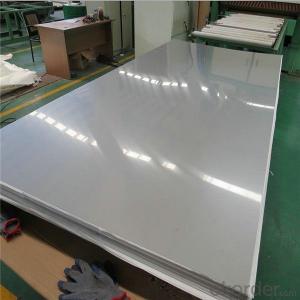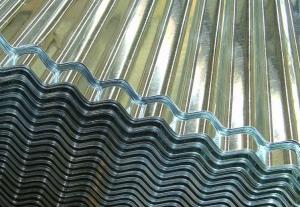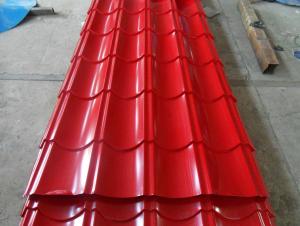CORRUGATED GALVANIZED STEELSHEET
- Loading Port:
- China Main Port
- Payment Terms:
- TT OR LC
- Min Order Qty:
- -
- Supply Capability:
- -
OKorder Service Pledge
OKorder Financial Service
You Might Also Like
The corrugated sheet is a high strength and durable steel, mostly used for a architectural decoration. We have scores of corrugated sheets production lines of different types, producing profiled sheets of all kinds of types and colors. Since it adopts high strength steel sheet and the dimension is designed reasonably, the corrugated sheets are widely used on roofs and walls of various buildings, which can be easily installed, be flexible and changeable, unrestricted by no factor of the buildings.
CORRUGATED GALVANIZED STEEL SHEET
STEEL GRADE & STANDARD:JIS G3302 SGCC
ZINC COATING MASS:Z50(+/-10g)
THICKNESS :0.19MM
WIDTH:1000MM
LENGTH:2000MM
PACKAGE TYPE:PACKED WITH STEEL PALLET
BUNDLE WEIGHT:AROUND 3MT
SHAPE AS PER PICTURE & SAMPLE FROM BUYER
It has been widely applied on civil construction like storerooms, special building roof and walls of wide-span steel structure building and so on.
- Q: Are steel sheets suitable for cryogenic applications?
- Yes, steel sheets are suitable for cryogenic applications. Steel has excellent mechanical properties and can withstand low temperatures without losing its structural integrity. It also has good thermal conductivity, which is beneficial for efficient heat transfer in cryogenic environments. Additionally, steel sheets can be easily fabricated and are cost-effective, making them a popular choice for various cryogenic applications such as storage tanks, pipelines, and aerospace components.
- Q: Can steel sheets be used in corrosive environments like saltwater?
- Yes, steel sheets can be used in corrosive environments like saltwater. However, the type of steel and the level of corrosion resistance it offers will determine its suitability for such conditions. Stainless steel, for example, is highly resistant to corrosion and is often used in marine and saltwater environments. It contains chromium, which forms a protective layer on the surface of the steel, preventing it from reacting with the saltwater. Other types of steel, such as carbon steel, may also be used in saltwater environments, but they require additional protective coatings or treatments to prevent corrosion. Regular maintenance and proper care are essential to ensure the longevity of steel sheets in corrosive environments like saltwater.
- Q: What is the typical hardness range for steel sheets?
- The typical hardness range for steel sheets can vary depending on the specific type of steel and its intended application. However, a common hardness range for steel sheets is between 20 and 60 on the Rockwell C scale.
- Q: How do steel sheets perform in terms of scratch resistance?
- Steel sheets are known for their exceptional scratch resistance. Due to their strong and durable nature, steel sheets are highly resistant to scratches and abrasions. This makes them ideal for various applications where the material may come into contact with potentially damaging objects or surfaces. Steel sheets can withstand normal wear and tear, making them suitable for heavy-duty and high-traffic environments. Additionally, steel sheets can be further enhanced with coatings or finishes to provide an even higher level of scratch resistance. Overall, steel sheets are renowned for their excellent scratch resistance, making them a reliable choice for many industrial and commercial applications.
- Q: What are the different coating options available for steel sheets?
- There are several coating options available for steel sheets, each offering unique benefits and protection against various environmental factors. Some of the most common coating options include: 1. Galvanized Coating: This is the most widely used coating for steel sheets. It involves applying a layer of zinc to the surface, which acts as a sacrificial anode and prevents corrosion. Galvanized coating provides excellent corrosion resistance and is suitable for both indoor and outdoor applications. 2. Galvannealed Coating: This coating is similar to galvanized coating but is further heat-treated to form a zinc-iron alloy layer on the surface. Galvannealed coating offers improved paint adhesion and weldability, making it suitable for applications that require painting or additional fabrication processes. 3. Electroplated Coating: This process involves immersing the steel sheet in a solution containing metal ions and applying an electric current to deposit a thin layer of metal onto the surface. Common electroplated coatings include zinc, nickel, and chromium. Electroplated coatings provide enhanced corrosion resistance and can also improve aesthetics. 4. Organic Coating: Also known as painted or coated steel sheets, this option involves applying a layer of organic material such as paint, powder coating, or plastic film to the steel surface. Organic coatings provide protection against corrosion, UV radiation, and abrasion. They also offer a wide range of colors and finishes, making them suitable for architectural and decorative applications. 5. Tin Coating: Tin-plated steel sheets have a thin layer of tin applied to the surface through an electroplating process. Tin coating provides excellent solderability, corrosion resistance, and food-grade suitability. It is commonly used in the production of food cans and other packaging materials. 6. Aluminized Coating: This coating involves applying a layer of aluminum to the steel surface through a hot-dipping process. Aluminized coating provides excellent heat reflectivity, corrosion resistance, and thermal conductivity. It is often used in applications that require heat resistance, such as exhaust systems and heat exchangers. These are just a few of the many coating options available for steel sheets. The choice of coating depends on factors such as the intended use, environmental conditions, and desired properties of the steel sheet. It is essential to consider these factors and consult with coating experts to determine the most suitable option for specific applications.
- Q: What are the different methods of surface cleaning for steel sheets?
- Surface cleaning of steel sheets offers various methods, each with its own advantages and applications. 1. Mechanical Cleaning: To physically eliminate dirt, rust, and other contaminants from steel sheet surfaces, one can utilize sandpaper, wire brushes, or abrasive blasting. This approach is ideal for heavy-duty cleaning and preparing surfaces for further treatment or coating. 2. Chemical Cleaning: By employing chemicals or detergents, one can dissolve or remove contaminants from the steel surface. This method is particularly effective in eliminating grease, oil, and other organic substances. It is crucial to select the appropriate chemical cleaner based on the type of contamination and the composition of the steel sheet, ensuring effective cleaning without surface damage. 3. Electrolytic Cleaning: This technique involves submerging the steel sheet in an electrolyte bath along with an electric current to dissolve and separate contaminants. Electrolytic cleaning is effective in removing stubborn rust, scale, and oxidation, while also providing a polished finish. 4. Power Washing: Also known as pressure washing, this method employs a high-pressure water stream to cleanse the steel surface. Power washing effectively removes loose debris, dirt, and mild contaminants. However, it may not be suitable for heavy-duty cleaning or the elimination of stubborn substances like rust. 5. Vapor Degreasing: Vapor degreasing utilizes solvent vapors to clean the steel surface. By exposing the steel sheet to these vapors, contaminants are dissolved and removed. This technique is particularly effective in eliminating oil, grease, and other organic substances. Vapor degreasing is a precise and controlled cleaning method commonly utilized in industrial applications. Before selecting a surface cleaning method, it is crucial to consider the type and severity of contamination, the desired level of cleaning, and the specific requirements of the steel sheets. Additionally, it is important to prioritize safety precautions and utilize appropriate protective equipment when performing any surface cleaning procedure.
- Q: What are the common thicknesses for aluminum-coated steel sheets?
- The common thicknesses for aluminum-coated steel sheets typically range from 0.016 inches (0.41 mm) to 0.040 inches (1.02 mm), depending on the specific application and desired strength requirements.
- Q: Are the steel sheets suitable for structural applications?
- Steel sheets are an excellent choice for structural applications, given their outstanding strength and durability. They are highly suitable for constructing buildings, bridges, and other structures that necessitate stability and support. With their remarkable tensile strength and capacity to bear heavy loads, steel sheets offer structural integrity and can endure diverse environmental conditions, such as earthquakes, hurricanes, and extreme temperatures. Moreover, steel sheets are easily fabricated and molded to meet precise design specifications, providing flexibility and versatility in structural applications.
- Q: Can the steel sheets be used for roofing purposes?
- Indeed, steel sheets are suitable for roofing applications. Steel roofing sheets are favored because of their long-lasting nature, robustness, and ability to endure severe weather conditions. They offer superb safeguard against elements like rain, snow, and hail. Moreover, steel roofing sheets possess fire-resistant properties and can endure strong winds, rendering them a dependable choice for roofing needs. Furthermore, steel sheets are lightweight, facilitating easier installation and reducing strain on the structure. They come in diverse designs and colors, enabling customization to suit personal preferences. All in all, steel sheets are a versatile and pragmatic option for roofing purposes.
- Q: Are steel sheets resistant to chemical exposure?
- Yes, steel sheets are generally resistant to chemical exposure.
Send your message to us
CORRUGATED GALVANIZED STEELSHEET
- Loading Port:
- China Main Port
- Payment Terms:
- TT OR LC
- Min Order Qty:
- -
- Supply Capability:
- -
OKorder Service Pledge
OKorder Financial Service
Similar products
Hot products
Hot Searches
Related keywords
